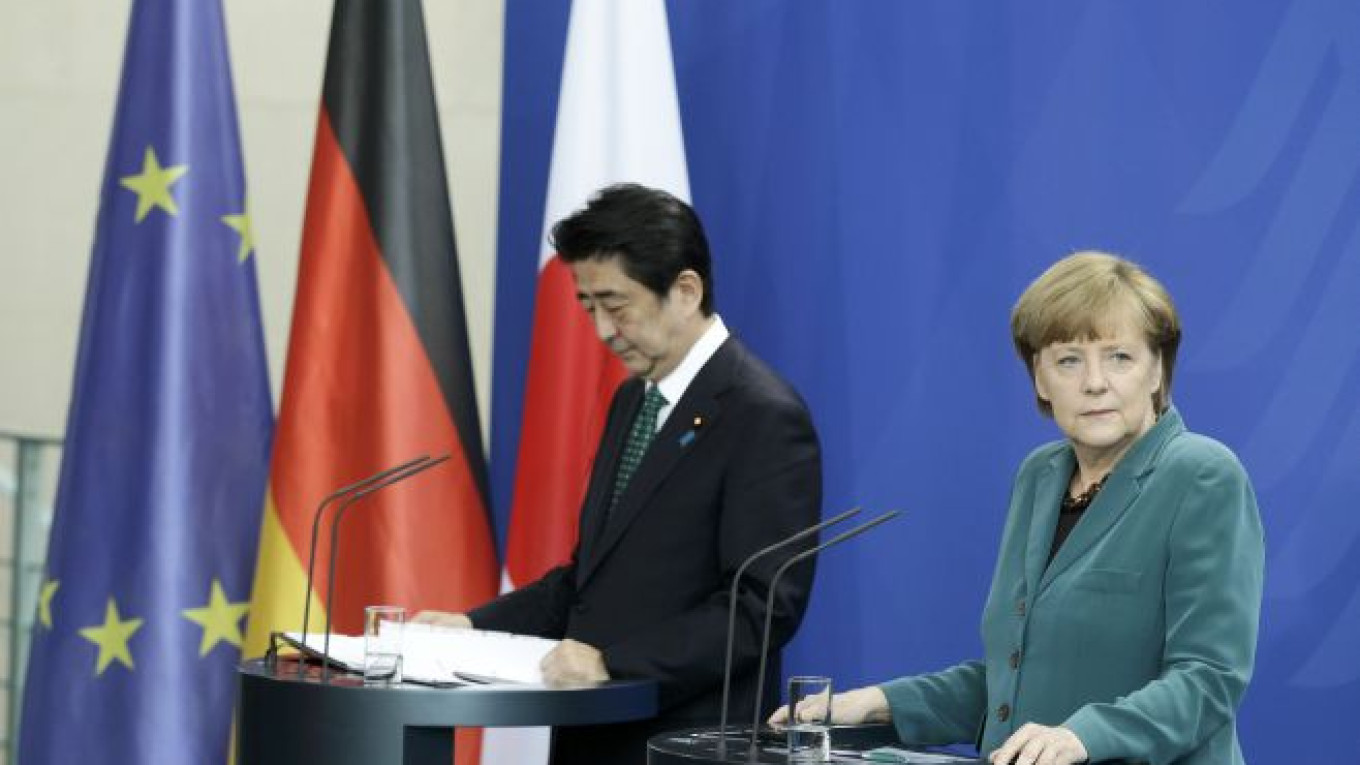Germany's Angela Merkel and Japanese Prime Minister Shinzo Abe said on Wednesday leading industrial powers would stand united on further sanctions against Russia if needed, despite Moscow's threat to retaliate against foreign energy companies.
Both are struggling to strike a balance between admonishing Moscow for annexing Ukraine's Crimean peninsular and failing to control pro-Russian separatists in eastern Ukraine, and looking after their countries' business interests and energy supplies.
The European Union, Japan and the U.S. have placed visa bans and asset freezes on dozens of individuals, some close to Russian President Vladimir Putin, but have held back on wider trade sanctions despite an escalation of the crisis in Ukraine.
Merkel said that if separatists holding observers from the Organization for Security and Cooperation in Europe in eastern Ukraine do not free them, and Russia does not use its influence to secure their release, "then we should not shy away from the need for further sanctions."
"We have always managed to agree on G7 declarations so far and I see no reason why further steps should not be unanimous," she said after talks with Abe in Berlin, the first stop of his week-long tour of Europe.
Following a new round of Western sanctions aimed at business leaders and firms close to Putin this week, the Russian leader said he saw no need for counter-sanctions but might reconsider foreign firms' participation in areas such as Russian energy.
But Merkel said Europe, the U.S. and G7 partners would stick to their joint response to Russia, adding: "We have thought through these measures and we have no reason to question our unity on sanctions or see it in another light."
"Japan, Germany and the other G7 countries will work together on what possible further measures need to be taken," said Abe, though he said it was also "important to communicate with the Russian side". This is a view shared with Merkel, who has the most fluent contacts with Putin among Western leaders.
Both emphasized the importance of Ukraine carrying out free elections on May 25 to give people the democratic choice of who should succeed pro-Russian president Viktor Yanukovych, who fled Kiev in February in the midst of bloody protests.
Abenomics? No Thanks
Merkel offered encouragement for Japan's long battle against deflation, but rejected the idea of Europe — where policymakers including European Central Bank chief Mario Draghi have played down talk of a similar threat — copying Japan's new stimulus policies, nicknamed "Abenomics."
"We in Europe — and this is what the Bundesbank and others including the European Central Bank say — are not at immediate risk of deflation and our path of economic consolidation is the right one," said Merkel, who responded to the euro zone crisis by prioritizing fiscal discipline over pro-growth policies.
"Japan's situation is different and specific," she said.
Abe, who has begun to reverse years of sub-par growth with expansionary fiscal and monetary policies, told a business audience in Berlin earlier on Wednesday that Japan was now "in the process of freeing itself from long-lasting deflation."
His week-long visit to Europe will also take in Britain, Portugal, Spain, France and Brussels, institutions such as NATO and the Organization for Economic Cooperation and Development and meetings with European business leaders.
See related stories:
A Message from The Moscow Times:
Dear readers,
We are facing unprecedented challenges. Russia's Prosecutor General's Office has designated The Moscow Times as an "undesirable" organization, criminalizing our work and putting our staff at risk of prosecution. This follows our earlier unjust labeling as a "foreign agent."
These actions are direct attempts to silence independent journalism in Russia. The authorities claim our work "discredits the decisions of the Russian leadership." We see things differently: we strive to provide accurate, unbiased reporting on Russia.
We, the journalists of The Moscow Times, refuse to be silenced. But to continue our work, we need your help.
Your support, no matter how small, makes a world of difference. If you can, please support us monthly starting from just $2. It's quick to set up, and every contribution makes a significant impact.
By supporting The Moscow Times, you're defending open, independent journalism in the face of repression. Thank you for standing with us.
Remind me later.


